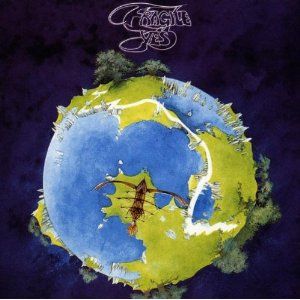In At The Deep End
 •
by
•
by Geoffery Openshaw

This is the first of two albums that got me into the whole progressive rock thing. The second album I will be covering in next weeks edition.
I feel I should make a disclaimer here, the opinions expressed here are my own, you are absolutely, 100% encouraged to form your own opinions, that is kind of the other reason I'm doing this, to bring this type of music to the forefront and let people form their own ideas.
I should also say, that while I consider myself to be a good creative non-fiction writer, I've never really written a review of anything before, so to start with I may end up using lots of similar words and expressions, hopefully I will get better as I go, so please bear with me.
For me, this will always remain as one of my favourite albums and have a special place in my heart. The melodies and songwriting are superb examples, to me, of just one iteration of Progressive Rock and although to some it may sound overdone and pretentious, that is exactly the point of this type of music and what makes it fun to listen to.
FRAGILE - YES

Line-up.
Vocals - Jon Anderson
Guitar, Backing Vocals - Steve Howe
Keyboards - Rick Wakeman
Bass Guitar, Backing Vocals - Chris Squire
Drums - Bill Bruford
Background.
Released in November of 1971 this is the fourth Yes album. It's the second album to feature Steve Howe on lead guitar and the first to feature Rick Wakeman on keyboards. The album consists of 4 collaborative tracks interspersed with 5 tracks showcasing the talents of the individual members. Although it doesn't gel very well it still makes for a very interesting listening experience. The Roger Dean science fiction inspired artwork helps to re-enforce the notion that this is not just another "rock" album and that there is something more to it.
The Album.
The album opens with an absolute corker of a track. Roundabout seamlessly fuses the talents of all the band members, from Steve Howe's barnstorming guitar work to the playful keyboard manoeuvring of Rick Wakeman, this track, for me, will always be one of my favourites. The next track is a solo effort by Rick Wakeman. Cans & Brahms is a short extract and interpretation of the 3rd movement in Brahms' 4th Symphony in E Minor. A nice little track, but a little show-offy on the part of Rick Wakeman. We Have Heaven is another solo piece, this time by Jon Anderson. He sings all the parts and then layers the tracks to get the effect heard in the song. Like all the solo pieces on the album, it's ok and goes someway to showing what talented musicians they were (and still are I hasten to add). Back to a band track now and this one is South Side of the Sky, written about an ill-fated Antarctic Expedition, it's a good example of using heavy riff's with the classical piano playing of Rick Wakeman and the vocal harmonies of Jon Anderson. Five Per Cent for Nothing is a solo piece by Bill Bruford and while not really a favourite of mine, it is interesting though ultimately serves as nothing more than a transition piece. Long Distance Runaround is a jaunty little number written by Jon Anderson and serves as a nice break from the heavier progressive pieces on the album. Next up is Chris Squire's solo contribution, The Fish (Schindleria Praematurus). It is a nice example of what you can do with a bass guitar when you overdub a number of different pieces to achieve a unique sound. Mood for a Day is Steve Howe's solo guitar offering and a nice, harmonious track, with undertones of flamenco, which contrasts well with the rest of the music on the album. Finally we get to Heart of the Sunrise, another example of what a great songwriting unit Yes were. Comprising of several different sections, a bass heavy riff, melodic piano and something slightly funky, they merge them brilliantly to create an astounding track.
Hope you enjoyed this first offering and stick around for more.
Geoff.


Comments
Cool, I'm going to go and listen to this music now 🙂
Good article, looking forward to the next! 🙂
HoUsE MuSiC d(😁)p (dirty dutch, electro, progressive, tech)
VOTED FOR NO POLITICS!
Agree with Wayne...by Christ it's a refreshing change \o/
Voted. I love anything rock related and enjoy reading about it too. Keep it up \o/